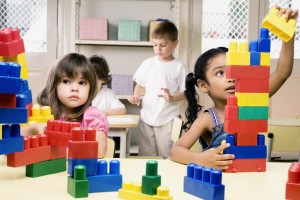|
|
July 20, 2015
 I give up!!!! Part 6 of my Parenting Q&A series brings a question about kids and mistakes. While it’s natural for parents to be on the look-out for our children’s missteps, how we respond can have a huge impact on a child’s developing autonomy and her view of a problem vs. a challenge.
When my daughter tries something and things don’t turn out the way she envisioned, she gets upset and gives up. We hear a lot these days about the importance of kids developing persistence and GRIT. What can I do to help her learn from mistakes and try again?
We’re all human and we all make mistakes. At least that’s what we say. But in some families children have learned it’s not safe to make mistakes because parents tease or shame. If a child repeatedly makes the same mistake parents may get frustrated and say, “You know better than that!” But if children actually knew better they would do better. Right? The fact that a child makes a mistake should not be cause for a parent to jump down the kid’s throat. That kind of reaction will only teach children that mistakes should be avoided!
Here’s the truth about mistakes: They are amazing opportunities to learn. Think about the word mistake … it’s a moment when learning has not yet taken hold. When the learning takes, then we don’t make that mistake again.
Parents might gain insight into their attitudes about mistake by looking back to their own childhood and how their parents responded to mistakes. Maybe you got yelled at or punished. Hopefully, you did not get hit, slapped or spanked, but maybe you did. If you experienced that kind of parental response, then you learned that mistakes must be avoided at all costs. But wait a minute! What kind of lesson is that? The first time we try anything we are going to fail. It would be a lucky fluke if we got it right, first time out of the gate.
How about we turn this “Avoid mistakes” mantra on its head? What if we give kids the realistic expectation that they will fail and they’ll learn something useful from every failure? What if we give them permission to fail and try again? When parents encourage their children’s to make mistakes, we teach them about persistence, GRIT and determination. They will learn to pick themselves up and evaluate what just happened. They will learn to modify their response so that their next attempt may result in a different outcome. That’s how you raise successful children who are fearless in facing obstacles.

April 15, 2014
 Actually, we’re playing AND learning! In my senior year in college I took a course called “Observation of Young Children.” For several hours a week I sat in a narrow, darkened room, behind a one-way mirror, looking into a pre-school classroom in action. Over the course of the semester I was assigned several 2-4 year olds to “observe” and to keep a log of every single thing the child did, how long he or she engaged in the behavior, etc. Later, I was to write up my detailed conclusions about whatever patterns I observed and what they might indicate about “my kids'” temperament, interests, learning styles, etc.
What I remember most was how seriously these young children took “playtime.” It was clear they were intently busy learning through play.
So in the late ’90s, when I first heard about Baby Einstein, a series of products of the “teach your baby to read” variety, I was skeptical. Babies and young children are in the business of figuring out how the world and everything and everyone they encounter operates. Hands-down, they learn best, with the greatest enthusiasm and retention, through hands-on exploration. (That includes but is not limited to touching, holding, jumping on, crawling through, rolling in, and sticking it in your mouth exploring.)
When I first heard about Brain Insights, my first thought was, “Oh is this another product for helicopter parents who need to chill?” Turns out, happily, it is not. Instead, Brain Insights, founded by early childhood educator, Deborah McNelis, is about understanding your child’s early brain development and using that to support a child’s learning through relaxed play. Bye bye smart apps for over-scheduled toddlers. Hello natural, hands-on parent-child fun!
Listen here to my conversation with Debora McNelis on this week’s Family Confidential podcast.

February 25, 2014
 Please won’t you be my neighbor? Marin County, where this story takes place, has the lowest violent crime rate of all nine San Francisco Bay Area counties. It also ranks 4th lowest in violent crime amongst all 58 California counties. You’ll need this for context. When folks in Marin have an issue with someone, we hash it out over organic Genmaicha tea down at the gluten-free bakery. Get the picture? Marin is a chill place. Which is why the little girl’s reaction to my friendly “Good morning” was such a shocker. But I’m getting ahead of myself.
On the sunny morning in question, I strolled my neighborhood and crossed paths with a five year old and her dad. I said “Good morning” to the father who stopped, smiled warmly and said, “Hey! How’s it going?” (Which is Marin for “Hi”) The two were obviously coming from the school down the hill, so I said to the girl, “Do you go to school at Brookside?” She looked down at her shoes and tightened her grip on her dad’s hand. Dad chuckled and informed me that his daughter is “kinda shy.” I didn’t think much of it and said to him, “My kids went to Brookside. It’s a nice school.” Dad agreed and started to tell me how his daughter was enjoying kindergarten. At that point the little girl yanked her father’s hand and said, “You’re not supposed to talk to strangers.” He seemed embarrassed but continued our conversation. “Yes, Ms. Hillson is a terrific teach… ” But he couldn’t finish because his daughter frantically pulled on his arm and tried dragging him away, all the while screaming, “Don’t talk to strangers, Daddy!!Don’t talk to strangers!!!”
She kept carrying on, pulling Dad along like a bad dog. He followed (lest his arm be severed from his body), but not before glancing back and giving me a helpless look.
Wow! I thought. That kid seriously needs some green tea and a yoga class. She’s obviously been indoctrinated into the “Stranger Danger” mindset to the degree that she believes everyone she doesn’t know is a lethal threat. She also doesn’t trust her dad can a) take care of himself and b) take care of her.
Walking on, I felt so sorry for the child and wondered what kids miss when they no longer have friendly encounters with neighbors.
A moment later another five year old girl appeared walking with her mom up the hill from the school (I do write fiction, but I swear I didn’t make this up.) Undeterred, I said, “Good morning” to the mom. At which point Little Girl#2 smiled brightly and said, ‘I go to Brookside School. I’m in kindergarten. Today my teacher read us Sylvester and the Magic Pebble. Do you know that story? It’s about a donkey who turns into a rock. It’s kinda sad but then his parents make a wish and he turns back into himself again. Then they have a party. Do you have kids? Do they go to Brookside?”
Her mom laughed, delighted her little girl was so confident and friendly.
I was delighted by her too. My kind of neighbor. We stopped and chatted for a while. I told her about a few other books she and her mom might enjoy together. Then we waved goodbye.
So what do you tell your children about strangers? I get that not everyone lives in a place like Marin, but what’s the right balance to strike when you teach kids about taking care of themselves when they are on their own and around people they don’t know?

December 10, 2010
We don’t really expect our kids to be happy all the time, but we still want them to be. It’s what I want for myself too! That’s why, after decades of rigorous research I’m ready to reveal my heretofore closely guarded Secret of Happiness. Yes, folks, I’ve developed a four-prong approach guaranteed to increase your Happiness Quotient (aka HapQ). It’s simple. If you want to be happy just:
- Do more of what brings you joy. A no-brainer, but most of us live like we’ve got forever to get to the fun stuff in life when actually it could all be over… Whoa! That kind of thinking lowers my HapQ. Not going there. Onward to #2.
 Avoid obvious joy-busters. If you know something (or someone) brings you down, limit your exposure or stay away altogether. A few of my instant “joy-busters” include: burnt popcorn, yellow jackets, and stubble. As for people who are consistently no fun to be around…. don’t go camping with them. Do NOT! Avoid obvious joy-busters. If you know something (or someone) brings you down, limit your exposure or stay away altogether. A few of my instant “joy-busters” include: burnt popcorn, yellow jackets, and stubble. As for people who are consistently no fun to be around…. don’t go camping with them. Do NOT!- Deal (ASAP) with whatever smooshes your joy. If a situation you’ve got no control over is stressing you out, you’re not powerless. There’s always something you can do to modify your response. You could, for example, close your mouth and quit complaining. It rarely improves a situation. In fact belly-aching often intensifies your awareness of how much you’re suffering. Some of my joy smooshers include: luke warm hot chocolate, aggressive louts, cold feet, misplaced eye-glasses, dog hair on the rug, and any paragraph I’m not yet satisfied with.
- Breathe. For anything you can’t avoid or flat-out change… you can always inhale (slowly & evenly), exhale (ditto), and smile. (Even a half-smile will do.) Up goes the old HapQ. Breathing is free, available 24/7, no membership or trendy work-out clothes needed. Breathing always restores my sense of humor except during the truly horrible year my mom was dying of Lou Gehrig’s Disease. And, much more recently, when we tried to build a new fence and our neighbor pitched a fit and a rather large attorney in our direction. I know, I know. “Don’t sweat the small stuff.” I try not to, but sometimes my mind loses me.
I can’t say exactly what all this has to do with parenting. Except that sometimes we just have to tough it out. And so do our kids. We can’t always rescue them up when they’re down. Maybe the best we can do is remind them that someone is always not happy, and right now they seem to be It. On the other hand, tomorrow (or even sooner) it might be their turn to be happy again. Just knowing that could help.

| |





 Avoid obvious joy-busters. If you know something (or someone) brings you down, limit your exposure or stay away altogether. A few of my instant “joy-busters” include: burnt popcorn,
Avoid obvious joy-busters. If you know something (or someone) brings you down, limit your exposure or stay away altogether. A few of my instant “joy-busters” include: burnt popcorn, 








